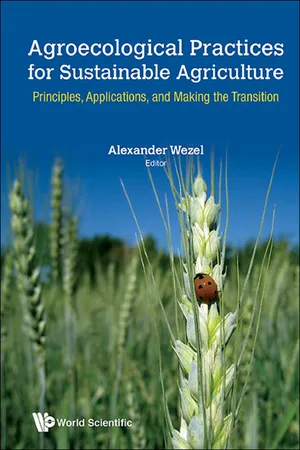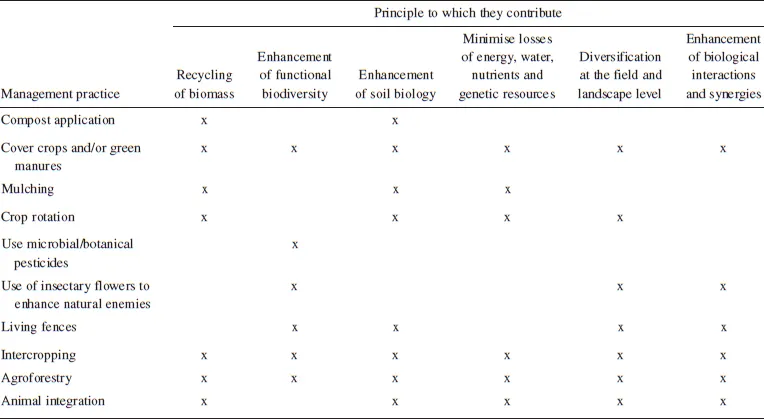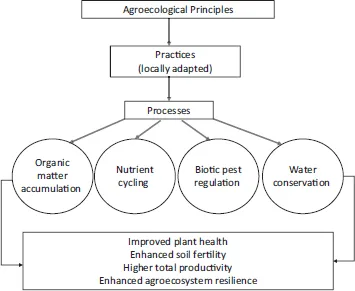
Agroecological Practices For Sustainable Agriculture: Principles, Applications, And Making The Transition
Principles, Applications, and Making the Transition
- 504 pages
- English
- ePUB (mobile friendly)
- Available on iOS & Android
Agroecological Practices For Sustainable Agriculture: Principles, Applications, And Making The Transition
Principles, Applications, and Making the Transition
About this book
-->
Good agroecological practices are indispensable for the development of sustainable agriculture. In this book, principles, diversity and applications of agroecological practices for a range of systems are presented, transforming scientific research and participatory knowledge of production into practical application. It illustrates a broad range of research and teaching being used within the farming community to demonstrate best practice and current state-of-play within the field. Agroecological methods used in crop farming, grass-based livestock farming, fish production, and other complex farming systems are discussed. Conclusions are drawn from studies to provide an outlook on future trends of agroecological practices and on policies supporting implementation.
Due to emphasis on real-life application, it is relevant not only to students of the agricultural sciences and public policy, but also to researchers, stakeholders and policy makers involved in the development of sustainable agriculture.
-->
--> Contents:
- Preface (Alexander Wezel)
- Agroecological Principles for The Conversion of Farming Systems (Clara I Nicholls, Miguel A Altieri & Luis Vazquez)
- Agroecology and Agroecological Cropping Practices (Alexander Wezel & Erin Silva)
- Applying Agroecological Principles for Regenerating Soils (Matt Ryan & Josephine Peigné)
- Transitions to Agroecological Nutrient Management Practices in the US Corn Belt (Jennifer Blesh & Ryan Galt)
- A Disturbance-Based Framework for Understanding Weed Community Assembly in Agroecosystems: Challenges and Opportunities for Agroecological Weed Management (Richard G Smith & Dave Mortenson)
- Integration of GM Crop Traits in Agroecological Practices in Europe: A Critical Review (Heikki Hokkanen & Ingeborg Menzler-Hokkanen)
- Entomovectoring: An Agroecological Practice of Using Bees for Biocontrol (Ingeborg Menzler-Hokkanen & Heikki Hokkanen)
- Agroecology and Participatory Knowledge Production and Exchange as A Basis for Food System Change: The Case of The Community Agroecology Network (Steve Gliessman, Rose Cohen & Heather Putnam)
- Assessing the Impact of Management Interventions in Agroecological and Conventional Cropping Systems Using Indicators of Sustainability (Cathy Hawes)
- A Framework for Designing Agroecological Livestock Farming Systems (Bertrand Dumont, Magali Jouven, Thierry Bonaudo, Raphaëlle Botreau & Rodolphe Sabatier)
- Agroecological Principles and Practices for Grass-Based Farming Systems (Alain Peeters & Alexander Wezel)
- Agroecological Management in Fish Production (Joel Aubin, Joel Robin, Alexander Wezel & Marielle Thomas)
- Education in Agroecological Learning: Holistic Context for Learning Farming and Food Systems (Charles Francis, Mary Wiedenhoeft, Robert Dehaan & Paul Porter)
- Teaching Agroecological Practices to Higher Education Students, Farmers and Other Stakeholders. Examples from France (Aurélie Ferrer, Florian Celette, Marion Casagrande, Joséphine Peigné, Jean-François Vian & Alexander Wezel)
- Learning Agroecological Practices as Components of Complex Farming Systems (Charles Francis, Tor Arvid Breland, Geir Lieblein, Lennart Salomonsson, Suzanne Morse and Anna Marie Nicolaysen)
- Agroecological Practices — Potentials and Policies (Alexander Wezel & Charles Francis)
-->
--> Readership: Students of the agricultural sciences and public policy, but also to researchers, stakeholders and policy makers involved in the development of sustainable agriculture. -->
Agroecology;Sustainable Agriculture;Agroecological Practices;Crop Farming;Livestock Farming;Fish Farming;Agricultural Policy0
Frequently asked questions
- Essential is ideal for learners and professionals who enjoy exploring a wide range of subjects. Access the Essential Library with 800,000+ trusted titles and best-sellers across business, personal growth, and the humanities. Includes unlimited reading time and Standard Read Aloud voice.
- Complete: Perfect for advanced learners and researchers needing full, unrestricted access. Unlock 1.4M+ books across hundreds of subjects, including academic and specialized titles. The Complete Plan also includes advanced features like Premium Read Aloud and Research Assistant.
Please note we cannot support devices running on iOS 13 and Android 7 or earlier. Learn more about using the app.
Information
Chapter 1
Agroecological Principles for the Conversion of Farming Systems
University of California, Berkeley, California, USA
†Department of Environmental Science, Policy and Management,
University of California, Berkeley, California, USA
‡Latin American Scientific Society of Agroecology (SOCLA), Cuba
1.Introduction
2.The conversion of farming systems
3.Principles versus practices
| 1. | Enhance the recycling of biomass, with a view to optimising organic matter decomposition and nutrient cycling over time. |
| 2. | Strengthen the “immune system” of agricultural systems through enhancement of functional biodiversity — natural enemies, antagonists, etc., by creating appropriate habitats. |
| 3. | Provide the most favourable soil conditions for plant growth, particularly by managing organic matter and by enhancing soil biological activity. |
| 4. | Minimise losses of energy, water, nutrients and genetic resources by enhancing conservation and regeneration of soil and water resources and agrobiodiversity. |
| 5. | Diversify species and genetic resources in the agroecosystem over time and space at the field and landscape level. |
| 6. | Enhance beneficial biological interactions and synergies among the components of agrobiodiversity, thereby promoting key ecological processes and services. |


Table of contents
- Cover
- Halftitle
- Title
- Copyright
- Preface
- Contents
- Chapter 1 Agroecological Principles for the Conversion of Farming Systems
- Chapter 2 Agroecology and Agroecological Cropping Practices
- Chapter 3 Applying Agroecological Principles for Regenerating Soils
- Chapter 4 Transitions to Agroecological Nutrient Management Practices in the USA Corn Belt
- Chapter 5 A Disturbance-based Framework for Understanding Weed Community Assembly in Agroecosystems: Challenges and Opportunities for Agroecological Weed Management
- Chapter 6 Integration of Genetically Modified Crop Traits in Agroecological Practices in Europe: A Critical Review
- Chapter 7 Entomovectoring: An Agroecological Practice of Using Bees for Biocontrol
- Chapter 8 Agroecology and Participatory Knowledge Production and Exchange as a Basis for Food System Change: The Case of the Community Agroecology Network
- Chapter 9 Assessing the Impact of Management Interventions in Agroecological and Conventional Cropping Systems Using Indicators of Sustainability
- Chapter 10 A Framework for the Design of Agroecological Livestock Farming Systems
- Chapter 11 Agroecological Principles and Practices for Grass-based Farming Systems
- Chapter 12 Agroecological Management in Fish Pond Systems
- Chapter 13 Education in Agroecological Learning: Holistic Context for Learning Farming and Food Systems
- Chapter 14 Teaching Agroecological Practices to Higher Education Students, Farmers, and Other Stakeholders: Examples from France
- Chapter 15 Learning Agroecological Practices as Components of Complex Farming Systems
- Chapter 16 Agroecological Practices: Potentials and Policies
- Index